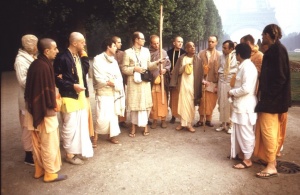CC Adi 10.67: Difference between revisions
m (1 revision(s)) |
No edit summary |
||
| Line 1: | Line 1: | ||
{{ | [[Category:Sri Caitanya-caritamrta - Adi-lila Chapter 10|C067]] | ||
<div style="float:left">'''[[Sri Caitanya-caritamrta|Śrī Caitanya-caritāmṛta]] - [[CC Adi|Ādi-līlā]] - [[CC Adi 10|Chapter 10: The Trunk, Branches and Subbranches of the Caitanya Tree]]'''</div> | |||
<div style="float:right">[[File:Go-previous.png|link=CC Adi 10.66|Ādi-līlā 10.66]] '''[[CC Adi 10.66|Ādi-līlā 10.66]] - [[CC Adi 10.68|Ādi-līlā 10.68]]''' [[File:Go-next.png|link=CC Adi 10.68|Ādi-līlā 10.68]]</div> | |||
{{CompareVersions|CC|Adi 10.67|CC 1975|CC 1996}} | |||
{{RandomImage}} | |||
==== TEXT 67 ==== | ==== TEXT 67 ==== | ||
<div | <div class="verse"> | ||
kholā-vecā śrīdhara prabhura priya-dāsa | :kholā-vecā śrīdhara prabhura priya-dāsa | ||
yāṅhā-sane prabhu kare nitya parihāsa | :yāṅhā-sane prabhu kare nitya parihāsa | ||
</div> | </div> | ||
| Line 12: | Line 16: | ||
==== SYNONYMS ==== | ==== SYNONYMS ==== | ||
<div | <div class="synonyms"> | ||
kholā- | ''kholā-vecā''—a person who sells the bark of banana trees; ''śrīdhara''—Śrīdhara Prabhu; ''prabhura''—of the Lord; ''priya-dāsa''—very dear servant; ''yāṅha-sane''—with whom; ''prabhu''—the Lord; ''kare''—does; ''nitya''—daily; ''parihāsa''—joking. | ||
</div> | </div> | ||
| Line 19: | Line 23: | ||
==== TRANSLATION ==== | ==== TRANSLATION ==== | ||
<div | <div class="translation"> | ||
The twenty-ninth branch was Śrīdhara, a trader in banana-tree bark. He was a very dear servant of the Lord. On many occasions, the Lord played jokes on him. | The twenty-ninth branch was Śrīdhara, a trader in banana-tree bark. He was a very dear servant of the Lord. On many occasions, the Lord played jokes on him. | ||
</div> | </div> | ||
| Line 26: | Line 30: | ||
==== PURPORT ==== | ==== PURPORT ==== | ||
<div | <div class="purport"> | ||
Śrīdhara was a poor brāhmaṇa who made a living by selling banana-tree bark to be made into cups. Most probably he had a banana-tree garden and collected the leaves, skin and pulp of the banana trees to sell daily in the market. He spent fifty percent of his income to worship the Ganges, and the balance he used for his subsistence. When Śrī Caitanya Mahāprabhu started His civil disobedience movement in defiance of the Kazi, Śrīdhara danced in jubilation. The Lord used to drink water from his water jug. Śrīdhara presented a squash to Śacīdevī to cook before Lord Caitanya took sannyāsa. Every year he went to see Lord Caitanya Mahāprabhu at Jagannātha Purī. According to Kavi-karṇapūra, Śrīdhara was a cowherd boy of Vṛndāvana whose name was Kusumāsava. In his Gaura-gaṇoddeśa-dīpikā (133) it is stated: | Śrīdhara was a poor ''brāhmaṇa'' who made a living by selling banana-tree bark to be made into cups. Most probably he had a banana-tree garden and collected the leaves, skin and pulp of the banana trees to sell daily in the market. He spent fifty percent of his income to worship the Ganges, and the balance he used for his subsistence. When Śrī Caitanya Mahāprabhu started His civil disobedience movement in defiance of the Kazi, Śrīdhara danced in jubilation. The Lord used to drink water from his water jug. Śrīdhara presented a squash to Śacīdevī to cook before Lord Caitanya took ''sannyāsa''. Every year he went to see Lord Caitanya Mahāprabhu at Jagannātha Purī. According to Kavi-karṇapūra, Śrīdhara was a cowherd boy of Vṛndāvana whose name was Kusumāsava. In his ''Gaura-gaṇoddeśa-dīpikā'' (133) it is stated: | ||
:kholā-vecātayā khyātaḥ paṇḍitaḥ śrīdharo dvijaḥ | :''kholā-vecātayā khyātaḥ paṇḍitaḥ śrīdharo dvijaḥ'' | ||
:āsīd vraje hāsya-karo yo nāmnā kusumāsavaḥ | :''āsīd vraje hāsya-karo yo nāmnā kusumāsavaḥ'' | ||
“The cowherd boy known as Kusumāsava in kṛṣṇa-līlā later became Kholāvecā Śrīdhara during Caitanya Mahāprabhu’s līlā at Navadvīpa.” | “The cowherd boy known as Kusumāsava in ''kṛṣṇa-līlā'' later became Kholāvecā Śrīdhara during Caitanya Mahāprabhu’s ''līlā'' at Navadvīpa.” | ||
</div> | </div> | ||
__NOTOC__ | |||
<div style="float:right; clear:both;">[[File:Go-previous.png|link=CC Adi 10.66|Ādi-līlā 10.66]] '''[[CC Adi 10.66|Ādi-līlā 10.66]] - [[CC Adi 10.68|Ādi-līlā 10.68]]''' [[File:Go-next.png|link=CC Adi 10.68|Ādi-līlā 10.68]]</div> | |||
__NOTOC__ | |||
__NOEDITSECTION__ | |||
Revision as of 07:30, 21 July 2021

A.C. Bhaktivedanta Swami Prabhupada
TEXT 67
- kholā-vecā śrīdhara prabhura priya-dāsa
- yāṅhā-sane prabhu kare nitya parihāsa
SYNONYMS
kholā-vecā—a person who sells the bark of banana trees; śrīdhara—Śrīdhara Prabhu; prabhura—of the Lord; priya-dāsa—very dear servant; yāṅha-sane—with whom; prabhu—the Lord; kare—does; nitya—daily; parihāsa—joking.
TRANSLATION
The twenty-ninth branch was Śrīdhara, a trader in banana-tree bark. He was a very dear servant of the Lord. On many occasions, the Lord played jokes on him.
PURPORT
Śrīdhara was a poor brāhmaṇa who made a living by selling banana-tree bark to be made into cups. Most probably he had a banana-tree garden and collected the leaves, skin and pulp of the banana trees to sell daily in the market. He spent fifty percent of his income to worship the Ganges, and the balance he used for his subsistence. When Śrī Caitanya Mahāprabhu started His civil disobedience movement in defiance of the Kazi, Śrīdhara danced in jubilation. The Lord used to drink water from his water jug. Śrīdhara presented a squash to Śacīdevī to cook before Lord Caitanya took sannyāsa. Every year he went to see Lord Caitanya Mahāprabhu at Jagannātha Purī. According to Kavi-karṇapūra, Śrīdhara was a cowherd boy of Vṛndāvana whose name was Kusumāsava. In his Gaura-gaṇoddeśa-dīpikā (133) it is stated:
- kholā-vecātayā khyātaḥ paṇḍitaḥ śrīdharo dvijaḥ
- āsīd vraje hāsya-karo yo nāmnā kusumāsavaḥ
“The cowherd boy known as Kusumāsava in kṛṣṇa-līlā later became Kholāvecā Śrīdhara during Caitanya Mahāprabhu’s līlā at Navadvīpa.”